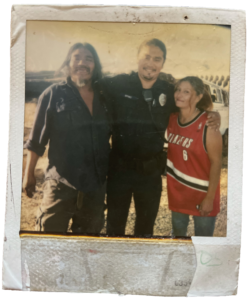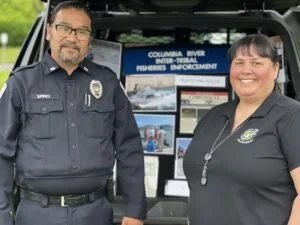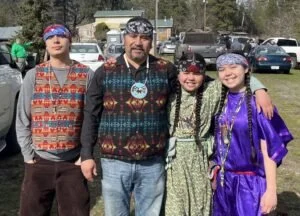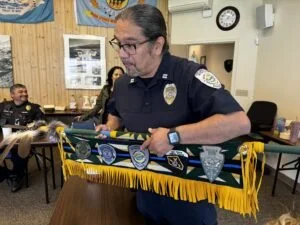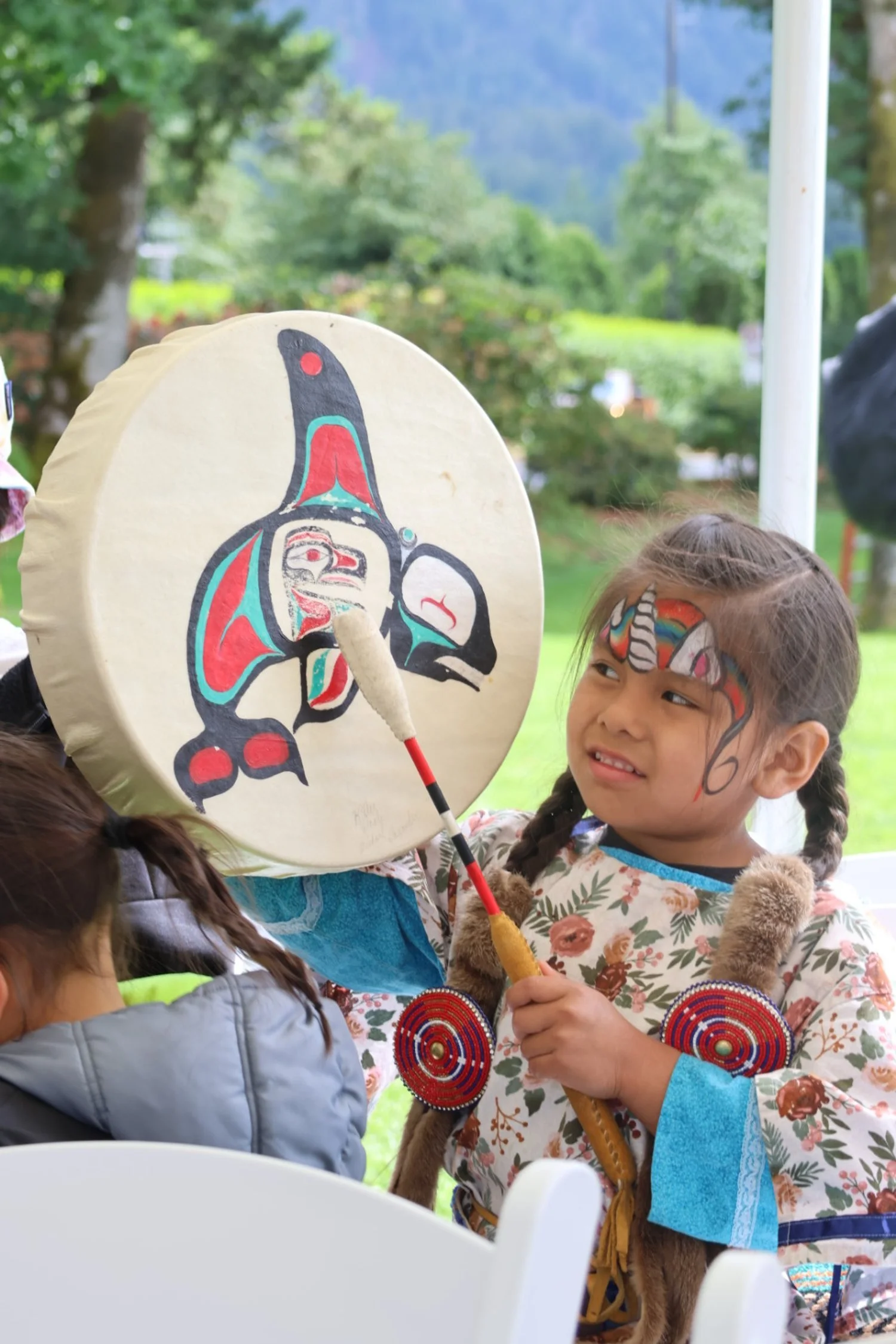Russell Spino: From Longhouse Whip Man to Chief of Police
Russell Spino, Warm Springs, was announced as the new Chief of Police for the CRITFC Enforcement department during their monthly staff meeting, June 12. Above, Spino stands outside the enforcement department after his announcement. Photo by Jeremy Fivecrows, CRITFC Communications Director
By Columbia River Inter-Tribal Fish Commission (CRITFC):
by Jill-Marie Gavin
Warm Springs, Ore. July 25, 2024 — Long-time Columbia River Inter-Tribal Fisheries Enforcement officer Russell Spino was promoted to chief, replacing the retiring Mitch Hicks.
With 23 years of service at the department, this marks a significant milestone in his life and career. Spino’s journey from his upbringing in the Columbia Gorge and spending time on in-lieu treaty fishing sites along Nchi’ Wána (the Sahaptin name for the Columbia River, pronounced “IN´chee wana”) to leading CRITFC Enforcement is a testament to his dedication to community, tradition, and law enforcement.
Born and raised in The Dalles, Oregon, Spino’s upbringing was led by the values of his tribal community and the culture of his people. He spent his childhood fishing at Lone Pine from scaffolds and on the riverbank with his father Jesse Spino. He also spent a lot of time in the close-knit community of Cloudville, Washington, where his grandmother lived. His involvement in the Lyle Longhouse instilled in him a deep-rooted connection to his cultural heritage. When he was 16 years old, the longhouse elders honored him with the role of being whipman. This role, which involves maintaining order and discipline within the longhouse, instilled in him a sense of responsibility and leadership from a young age.
CRITFC executive director Aja DeCoteau praised Spino during an Enforcement Department staff meeting where she made the promotion announcement. “Spino really understands the river, the people, and the cultural context of this work. He also brings positivity to the workplace and to the work that is so necessary for CRITFC Enforcement. I look forward to the leadership and skill he will bring to his department,” said DeCoteau.
Despite his current position, Spino’s relationship with law enforcement wasn’t always positive. Like many in his community, he harbored a distrust of police officers, shaped by years of negative experiences. “Ninety percent of my interactions with law enforcement were negative,” Spino recalls. One thing Spino knew for sure was that he deeply respected and valued tribal sovereignty and treaty rights, and he wanted to use those pillars to shape his career.
Chief Spino with his parents Jesse and Sandy Spino at the Lone Pine In-lieu Fishing Access Site in 2002.
Spino’s journey into law enforcement began in 2001. With a high school diploma and a strong desire to protect his community’s rights, he was hired as a CRITFC Enforcement officer and quickly advanced within the department. He pursued further education, earning advanced police certificates and, over time, completing an associate degree in general studies. His dedication and hard work led to his promotion to captain in 2022, where he oversaw day-to-day activities and assisted Chief Hicks.
Spino and the entire CRITFC Enforcement team play a crucial role in protecting the sovereignty of the tribes by enforcing tribal laws and ensuring the conservation of vital resources like salmon. “The heart of our organization really starts here,” DeCoteau emphasized, “Our values incorporate our worldview and how we think about the work that we do to ensure we have fish for future generations, not just seven, but 28, 50 generations from now, that we still have fish on this river.”
“The basis of a treaty between tribes and the government is the sovereignty of the tribes,” Spino added. “Our primary goal is conservation enforcement, helping to bring salmon back to the river and protecting tribal people.”
Chief Spino with wife Jennifer Spino at an outreach event. Both Chief Spino and his wife work for the enforcement department.
Central to Spino’s philosophy is “Tamanwit,” the unwritten law taught by Columbia River Tribes that governs the sacred relationship between humans and the natural world. This principle guides his approach to law enforcement, balancing his duties as an officer with his commitment to cultural traditions. “I consider myself a longhouse person and adhere to the unwritten law,” Spino says. “I believe in the sacred law and our covenant with the animals to help take care of the fish so they can in turn help take care of our people.”
Reflecting on his journey, Spino acknowledges the influence of elders and mentors who saw potential in him and guided him toward his purpose. “An elder once said that we all have a purpose on this earth,” he recalls. “It’s your responsibility to find out what that purpose is and go live it.” For Spino, his purpose has been to bridge the gap between his cultural heritage and his role in law enforcement, ensuring that both the unwritten law and the modern written laws of his people are respected and upheld.
As the new chief of police, Spino is committed to building on the foundations laid by his predecessors, particularly former Chief Hicks. He plans to implement a law enforcement committee that includes tribal elders and community members to address historical issues and foster empathy among officers. By humanizing each other and understanding the generational trauma caused by negative interactions with law enforcement, Spino hopes to improve relationships and build trust.
Captain Spino with his children (l to r): Ryan, Lyla, and Abigail.
Captain Spino with his children (l to r): Ryan, Lyla, and Abigail.
Spino’s experiences have also fueled his determination to change how law enforcement is perceived within his community. He aims to foster positive interactions between officers and tribal members, especially the youth. “My expectation of our officers is to create positive interactions with our community,” he explains. “I don’t want kids to grow up believing [police] are the bad guys.”
Chief Spino shows a staff he made for former Police Chief Mitch Hicks during his retirement party at the enforcement main office May 30th. Hicks retired officially on May 31 and Spino was announced as the new chief June 12.
As Spino took over his first staff meeting as chief of police on the heels of DeCoteau’s surprise announcement, the room filled with applause, underscoring the genuine support he has from his colleagues.
Spino’s inaugural address as police chief resonated deeply with the staff as he outlined his vision for continuous improvement and excellence within the department. “It’s my goal to continue to bring excellence to this department. Most importantly understanding the why—why we exist, why we’re here on the river—and incorporate that in our vision, mission statement, and core values,” he said.
“I’m excited and ready for change,” Spino said in closing. “Good is all right, but what about great? What about better? That should be a moving target on the horizon that we’re always trying to reach.”
For more about Russell Spino, please visit here: https://columbiacommunityconnection.com/the-dalles/column-local-grads-make-the-world-a-better-place-episode-10-meet-russell-spino
Support Local News
Available for Everyone; Funded by Readers / Photo: Jill-Marie Gavin


